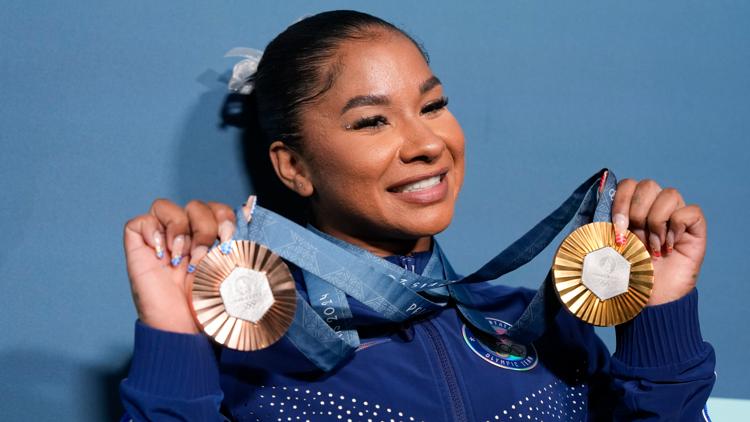The score change and subsequent challenge have added an element of drama and heartbreak to the competition.


WASHINGTON — U.S. Olympic bronze medalist Jordan Chiles will likely have to return her medal after the highest authority in sports ruled against her on an appeal of the women's floor exercise final, in the latest dramatic turn for the event's controversial conclusion.
The ruling, released Saturday by the Court of Arbitration for Sport, said that the U.S. team had challenged Chiles' score four seconds after the 1-minute deadline, and that her original score would be reinstated.
USA Gymnastics, the organization that sends U.S. gymnasts to the Olympics, responded in a post on social media saying they were "devastated" by the decision.
"We are devastated by the Court of Arbitration for Sport ruling regarding women's floor exercise. The inquiry into the Difficulty Value of Jordan Chiles' floor exercise routine was filed in good faith and, we believed, in accordance with FIG rules to ensure accurate scoring," the post reads. "Throughout the appeal process, Jordan has been subject to consistent, utterly baseless and extremely hurtful attacks on social media. No athlete should be subject to such treatment. We condemn the attacks and those who engage, support or instigate them. We commend Jordan for conducting herself with integrity both on and off the competition floor, and we continue to stand by and support her."
Chiles was the last competitor during the floor exercise finals on Monday and it initially looked like she was going to miss out on a medal. But a few minutes later, her heartbreak turned to jubilation as she found out she won the bronze.
So, what exactly happened?
Chiles initially received a 13.666 from the judges - which put her in fifth place.
After some delay, her total was boosted by 0.1 when she filed an inquiry about the difficulty component of her score. That adjustment pushed Chiles past Romanians Ana Barbosu and Sabrina Maneca-Voinea and into third.
Barbosu was standing on the floor holding a Romanian flag when she looked up and saw the scoring change on the video board. She dropped the flag in shock, brought her hands to her face and walked off in tears.
Since after the 2004 Summer Games, the International Gymnastics Federation made it so a score is divided into two parts. The difficulty or “D-score” is what a gymnast does. The execution or “E” score is how well they do it.
A similar situation happened with Team USA's Aly Raisman during the 2012 Olympics. She was the last gymnast to compete on the balance beam and initially was in fourth, until judges reviewed her routine again and raised her score to the bronze medal.
Furious response from Romania
“I can’t believe we play with athletes mental health and emotions like this… let’s protect them,” the nine-time Olympic medalist wrote on X.
The Romanian delegation vowed to launch an inquiry into the score change, causing the CAS to take up the case.
Romania’s Prime Minister Marcel Ciolacu said Tuesday that he would boycott the Paris Olympics ’ closing ceremony due to a “scandalous situation” at the end of the gymnastics competition.
“I decided not to attend the closing ceremony of the Paris Olympics, following the scandalous situation in the gymnastics, where our athletes were treated in an absolutely dishonorable manner,” Ciolacu said in a Facebook post. “To withdraw a medal earned for honest work on the basis of an appeal ... is totally unacceptable!”
Ciolacu promised Romania would honor Barbosu and fifth-place finisher Sabrina Maneca-Voinea, also Romanian, as Olympic medalists, “including in terms of the prizes.”
“You have with you an entire nation for which your work and tears are more precious than any medal, no matter what precious metal they are from,” Ciolacu said.
It's unclear if he will boycott the ceremony now that Barbosu appears back on track to get the bronze medal.
It's also unclear if the U.S. can appeal the CAS decision any further.
What is an inquiry in gymnastics?
An inquiry is a verbal, and then written, challenge of the score of a gymnast's routine, according to the USA Gymnastics website. Basically, if the gymnast or coach thinks they didn't get the right score for some specific reason, they can make an appeal. The inquiry can be resolved by using video review.
According to Sports Illustrated, making an appeal officially costs $300 - but the money is returned if the inquiry is upheld.
Olympian John Roethlisberger explained on the live broadcast the inquiry specifically centered on a tour jete full, which Jordan Chiles didn't get full credit on during last week's qualification round or initially during Monday's routine.
He explained that the Team USA coaches thought she completed the skill better this time and had "nothing to lose" in appealing. The judges decided to give it to her, which was enough to jump onto the medal podium.
Olympian Laurie Hernandez added during the broadcast that the reason inquiries exist is "sometimes they do miss it."
Meanwhile, Simone Biles added an 11th medal to her Olympic career with another silver. Brazil's Rebeca Andrade won gold in the floor exercise by .033.
The Associated Press contributed to this story.
.png)









 English (US) ·
English (US) ·